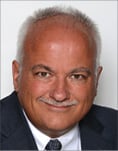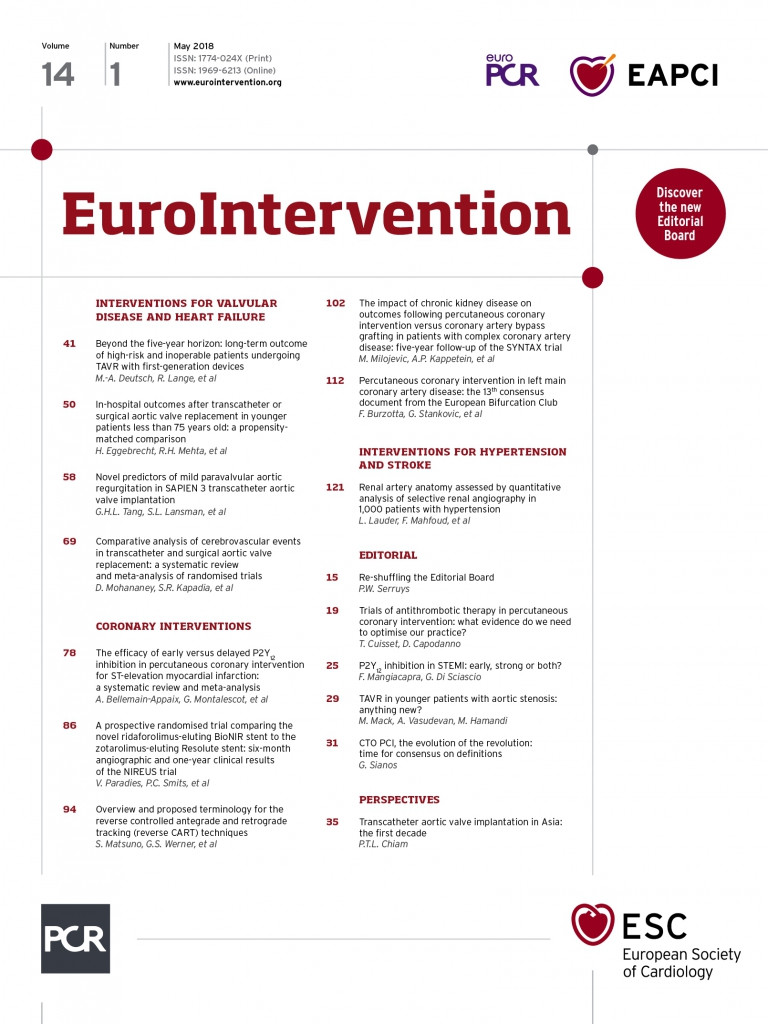The EAPCI, a strong voice for the interventional community

As is customary at this time of the year, the incoming EAPCI president and the outgoing president of the last two years address the readers with a “presidential criss-cross”, outlining the state of the association, our ambitions for the future and highlighting the achievements of past years.
I take the baton from Michael Haude who has served as EAPCI president from 2016 to 2018 and who gives a detailed personal view of his time in office in the following article.
At this time I would like to thank Michael, and his predecessor Stephan Windecker, who now leaves the board after serving as Immediate Past President, for their commitment and their work for our community. We have seen EAPCI grow from strength to strength, an association embedded in the European Society of Cardiology, with unique structures within the world of interventional cardiology. Our two annual courses, EuroPCR and PCR London Valves, are the premier events on the educational interventional calendar. In the last two years we have renewed our commitment to work closely with PCR and the ESC in an updated agreement, which in itself was a major achievement for my predecessors.
I am taking over an association with a very active membership, thriving committees and a track record of major game-changing activities, such as Stent for Life (now Stent. Save a Life), Valve for Life, the EAPCI Fellows Course which takes place at EuroPCR, to name but a few.
In the years to come we will continue to work to provide value to our members, across all member countries and across all member centres. We will see the first exams for a unified Certification for Interventional Cardiology in May 2018. Recognition of the quality of training will continue to be a priority, in order to support the careers of our younger colleagues. The committee “New Initiatives for Young Interventionalists” has been a source of inspiration for new ideas and projects, and will continue to thrive under new leadership.
We will continue to be a strong voice in the science of interventional cardiology. Our journal, EuroIntervention, has reached new impact levels recently, and the European contribution to research and policy is more relevant than ever. Our contributions to ESC guidelines, consensus statements, registries, and the White Book, as well as individual trials, will be at the heart of our scientific activities.
A major objective in the coming two years is to strengthen the engagement of our female colleagues in interventional cardiology. You will see an increased number on our committees, and increased activities and visibility in our dedicated Women Committee. The entire EAPCI Women Committee has been invited to the Editorial Board of EuroIntervention.
Our EAPCI mission is “To reduce the burden of cardiovascular disease through percutaneous cardiovascular interventions”. Our primary goal is to improve the health of our patients. However, there remain significant patient-related barriers to optimal treatment, be it access to healthcare, disparity, or simply lack of information. The theme of this year’s EAPCI summit is “Patient Focus in Interventional Cardiology”. We aim to develop strategies to close the gaps between guidelines and real-world care provision by identifying, and then addressing, patient-related barriers to optimal treatment.
I am looking forward to working with the established team at the European Heart House, and our newly elected and appointed Board, which will be announced on the occasion of EuroPCR 2018.
I will be taking the helm of a vibrant community, an association that has come a long way since its foundation out of the Working Group 10 of the ESC and EuroPCR over ten years ago. On behalf of the EAPCI community I want to extend my sincere thanks to Michael Haude and the departing members of the 2016 Board, and extend a warm welcome and an invitation to all members to be active participants in the life and work of our Association.
Evolution and continuity

The spring has always been the moment of the year when we speak about renewal and our association has developed a sort of tradition of its own to express this idea. As an organisation whose mission is “to reduce the burden of cardiovascular disease through percutaneous cardiovascular interventions” the EAPCI evolves in any number of concrete ways, one of which is the democratic renewal of our leadership. Every two years, in this, our official journal, we offer what has become our now traditional article in which the outgoing president, in this case myself, invites the incoming president, in this case Andreas Baumbach, to speak of our past accomplishments and future desires – what we have done and what we hope to accomplish – it is what we have come to call “the presidential criss-cross”.
It is now my turn, after two busy years of leading the EAPCI, to bid adieu as president of our association, acknowledge the rapid passage of time and speak of the things we have achieved over the last 24 months. I am well aware, as we all are, that this success could only have been possible through the commitment of the many who work tirelessly with us, and even their commitment would not have been enough if it had not been facilitated by the solid foundations that our predecessors had created and left for us to build on.
The EAPCI has been extremely lucky – from the career of Andreas Grüntzig and his fellow interventional pioneers which we celebrated last year and whose work we inherited, to the ongoing developments in our field fuelled by the immense creativity, clinical intelligence and innovative technology which have come together to produce the critical tools that provide the unique avenues to the improved care that we offer today.
Over the past two years we have been able to advance on many fronts that will today – and in the future – benefit our members. To begin with, the adoption of the EAPCI constitution has allowed the further integration of the EAPCI within the framework of the ESC, permitting the expansion of our work in this stellar international organisation. An example of this could be seen last year in the key role played by interventional cardiologists and members of the EAPCI in the programme for the 2017 ESC annual scientific meeting.
This integration can also be witnessed in the renewed agreements between the EAPCI, the ESC and the PCR family and Europa Group, ensuring that the two main scientific meetings of the EAPCI – EuroPCR and PCR London Valves – have the full backing of all the essential actors in the field of cardiology. In addition, EuroIntervention – our official journal – has now adopted a similar front page style in conformity with the other journals of the ESC family, thus underlining our common goals.
Over the two years of my presidency, education, which has always played a central role in the life of our association, has continued to be emphasised in such projects as the officially recognised PCR-EAPCI textbook, and the EAPCI Fellows Course. The EAPCI has expanded its role in offering guidance to our members and the speciality through such important position papers as the one on valve durability directed by Sonia Petronio and Davide Capodanno.
The EAPCI White Book project, under the leadership of Emanuele Barbato, in cooperation with the ESC Atlas project, will be released during EuroPCR 2018, adding to the prestigious and useful offerings of our association (the ESC Atlas project itself will be presented during the ESC annual congress later this year). The successful launch of the Valve for Life initiative, now operating in its third pilot country, Portugal, was also one of the important EAPCI events that took place during the last two years.
Similarly, and indicative of the excellent work being accomplished by the different committees of our association, the EAPCI interventional cardiology exam has been developed by the Education and Training Committee under the auspices of Dariusz Dudek and Eric van Belle. For the first time, the theoretical section of this European-wide standardised exam will be offered during EuroPCR 2018.
These two years have indeed been full and, I believe, a true expression of the work and needs of our members and our speciality. I have been proud to participate, proud to represent this association during the last 24 months, and will continue to be committed to what we have – and will – accomplish.
Though we remain ever mindful of the debt we owe to those who went before, I want to thank the many members of the EAPCI who work with us today and who have made my presidency – and our association – so fruitful. I also want to take this opportunity to offer my special thanks to my collaborators on the EAPCI board, and also to the dedicated women and men working and leading the different committees of our association who have made the EAPCI what it is today. Finally, I would like to thank Marielle de la Torre, EAPCI Association Manager, and her team, for their tremendous help throughout the last two years.
Now the EAPCI has a new president. We wish him our very best, but I know, from my own experience, that he will be inheriting the leadership of an association that understands more fully than ever before that “together we can accomplish more” for ourselves, and for the quality of the care we offer.
Thank you all….

